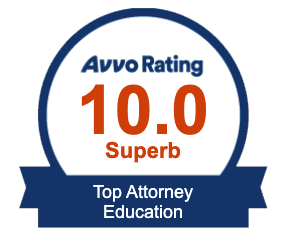This is will the last post for awhile as the school year has ended and we all entitled to take a summer break.
I attended a number of IEP meeting for families of children with disabilities in April and May this year. I have a few impressions and thoughts to share. First, all of my families (parents) thought that their previous IEP was deficient in some way and they wanted an attorney to attend the meeting with them. Most parents, of course, do not attend IEP meetings with an attorney. Most parents feel that bringing an attorney to an IEP meeting is adversarial. This is not true, however. An experienced special education attorney is an advocate for the parent and can ask questions and add insight that the parents may not know. After 30 years of representing parents at IEP meetings I think I can share my experience and insight at these meetings and be helpful in developing an appropriate IEP. Parents are usually surprised at the attention they receive when they bring a special education attorney to an IEP meeting. They notice that the size of the IEP team will substantially increase – sometimes double the number of IEP teams that the parents have experienced in past meetings. They also notice that the school personnel has more expertise than in past IEP meetings. For example, parents of a child with autism I represented this spring did not feel that the previous IEP team listened to their requests for certain instruction, services, and programming. At the IEP meeting I attended, the school system brought in an autism specialist and other specialized personnel from the central office. These additional specialized school staff were able to bring out issues for discussion that resulted in a better crafted IEP for the child. It provided better goals, objectives, related services, accommodations and personnel supports. At other IEP meeting I attended the parents were suddenly able to receive specialized instruction, related services, assistive technology, personnel and student supports and accommodations and other items that the IEP team had previously ignored or refused to provide. Suffice it to say that all of the parents I represented at these IEP meetings were very happy that they hired me to attend these meetings.
The sad thing is why does a parent have to hire a special education attorney to attend an IEP with them? Shouldn’t the school system provide appropriate instruction, services, programming and placement for the child without an attorney? Yes. In some cases the reason why the school system does not develop an appropriate IEP for the parents and child is that the parents are not sufficiently knowledgeable about the special education needs of their child. In the same way that I am likely to hire an IT person when I have a problem with my computer because I do not have the expertise or knowledge to repair it, parents are willing to hire a special education attorney to help “repair” the IEP. Special education law and practice is very complex. Some parents have knowledge and insight about their child’s disability and educational needs but it may be enough. My job is to bring my special education expertise to the IEP meeting and advocate for an appropriate program for the child.
Other parents retain a special education attorney because they believe the school system will not provide their child with appropriate IEP without such an attorney. I think this is also true in many cases. Bringing an experienced special education to an IEP meeting usually equalizes the negotiating power of both sides. Without an attorney, many parents feel overwhelmed by the educational jargon and complicated process to develop an IEP. With an experienced special education attorney, the parents feel more empowered and feel more comfortable that the IEP team members will listen to their concerns, ideas and suggestions. In my experience, many parents walk out of the IEP meeting and tell me that they would have received the specialized instruction, services, programming or placement they wanted if I was not there. When you bring an attorney to the IEP meeting it makes the school system more accountable to the IEP process and the law.
With this said, IEP season is now over. But before long the 2014-2015 school year will begin. Some children with disabilities will have extended school year services this summer and will hopefully reap the benefits of such services into the new school year. Other parents will find that their child’s transition from elementary school to middle school, and from middle school to high school will be rocky for the upcoming school year. And there will be children that will have behavioral challenges that will result in their suspension and change of educational placement for the next school year. So if you believe that the current IEP for your child is inappropriate, that your child is not receiving the specialized instruction, services, accommodations, supports, programming, placement or other things you believe he or she needs to be successful, you can let me know. I am just a call away.
I hope you and your family have a restful and fun summer.

